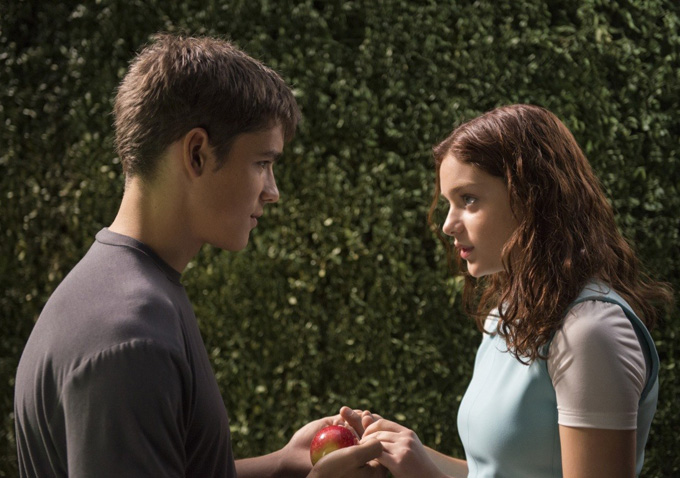By providing your information, you agree to our Terms of Use and our Privacy Policy. We use vendors that may also process your information to help provide our services. This site is protected by reCAPTCHA Enterprise and the Google Privacy Policy and Terms of Service apply.
Review: Why ‘The Giver’ is a Flawed Adaptation of Lois Lowry’s Book

After two decades of gracing middle school syllabi, Lois Lowry’s “The Giver” has finally landed on the big screen. For many millenials, the book acted as gateway literature to the likes of Orwell, Atwood and Kafka, introducing them to existential concepts (utopia, dystopia, anti-utopia) in a digestible Y.A. format. Almost as long in the making, with Jeff Bridges attached as producer since the mid-90s, the film adaptation is as faithful to the text as one could hope.
Unfortunately, this also means that it stumbles through the same issues as the original book while carrying a lot of baggage.
In spite of grand, world-building special effects and a stellar cast, the film falters under giant leaps of faith that land it just outside of the typical audience’s threshold of suspension of disbelief. For fans of the book, this adaptation brings it to paint-by-numbers life, blurring over many details while capturing the overall, at times overwhelming, spirit. For newcomers, it’s a familiar tale of self-discovery set in a semi-distant future — a young man is “chosen,” he discovers a new outlook and becomes the champion for free thinking.
 Jonas (Brenton Thwaites) is a teen on the cusp of maturity (a more bankable age bracket than the book’s 12-year-old). He has friends, minds his parents and manners, and is going to be assigned a career tomorrow. In his introductory voice-over, Jonas think-utters, “I didn’t want to be different. Who would?,” speeding the audience up to this antiseptic world, void not only of color but also emotion, that emphasizes sameness for the greater good. This whitewashed, manicured community is based on a set of rules (including no lying) and their strict enforcement, or else you are dispatched to the rightfully ominous-sounding “elsewhere.”
Jonas (Brenton Thwaites) is a teen on the cusp of maturity (a more bankable age bracket than the book’s 12-year-old). He has friends, minds his parents and manners, and is going to be assigned a career tomorrow. In his introductory voice-over, Jonas think-utters, “I didn’t want to be different. Who would?,” speeding the audience up to this antiseptic world, void not only of color but also emotion, that emphasizes sameness for the greater good. This whitewashed, manicured community is based on a set of rules (including no lying) and their strict enforcement, or else you are dispatched to the rightfully ominous-sounding “elsewhere.”
Over dinner, during the time allotted for sharing feelings, Jonas reveals to his parents that he is “terrified” (rather than the book’s “apprehensive”) about the prospect of tomorrow’s sorting, to the chagrin of his straight-laced, Department of Justice mother (picture perfect, easy-to-grimace Katie Holmes), who tuts him to mind the accuracy of his words, and the slight dismay of his Nurturer father (icy yet ultimately tender Alexander Skarsgard).
During the sorting ceremony (with emotionless Elders instead of a magical hat), we are treated to a Meryl Streep hologram as the Chief Elder/M.C. with the warmth of a school administrator, making a few roll-your-eyes corny jokes and thanking each to-be-adult for their childhoods. While others are selected as caregivers and groundskeepers, Jonas is chosen as an apprentice to the enigmatic Receiver of Memory (gruffly voiced and bearded Jeff Bridges). From there, we follow Jonas’ journey from a “life of shadows” to discovering actual emotions through the Receiver’s shared memories and a greater beyond (in a live-action Y.A. take on Plato’s Allegory of the Cave).
 As Jonas, Australian newcomer Thwaites (Prince Philip in “Maleficent”) has the physicality of an abandoned Hemsworth brother and the emotional depth of a wide-eyed child, which places him perfectly as a Y.A. lead. Israel-born newcomer Odeya Rush plays Fiona, Jonas’ love interest, with a matching wide-eyed adorability, possessing a young teen quality of Mila Kunis meets Chloe Grace Moretz. Jonas’ sessions with the Receiver oscillate between drama master classes and therapy, hitting certain moments over-emphatically and recessing into cuts to blurred-shot, shaky-cam “memories.” Since Jonas is being trained as the new Receiver of Memory, the Receiver dubs himself the Giver, noted through a self-referential gleam in Bridges’ eye during an on-the-nose close shot mid-conversation.
As Jonas, Australian newcomer Thwaites (Prince Philip in “Maleficent”) has the physicality of an abandoned Hemsworth brother and the emotional depth of a wide-eyed child, which places him perfectly as a Y.A. lead. Israel-born newcomer Odeya Rush plays Fiona, Jonas’ love interest, with a matching wide-eyed adorability, possessing a young teen quality of Mila Kunis meets Chloe Grace Moretz. Jonas’ sessions with the Receiver oscillate between drama master classes and therapy, hitting certain moments over-emphatically and recessing into cuts to blurred-shot, shaky-cam “memories.” Since Jonas is being trained as the new Receiver of Memory, the Receiver dubs himself the Giver, noted through a self-referential gleam in Bridges’ eye during an on-the-nose close shot mid-conversation.
Although not quite as aged or scraggly as The Giver from the book cover, Bridges encapsulates a self-assured wisdom and jaded swagger as he tells Jonas that he does indeed lie and mostly for his own entertainment. While the film progresses, The Giver reveals a softness under his jagged granite veneer, shown mostly through Bridges’ guileless reaction shots and sincere (bordering on Dude-like camp) vocal inflections. Inversely, Streep’s Chief Elder chips away to reveal a watered-down, longer-haired Miranda Priestly, with each move progressively growing colder and more calculated. Taylor Swift makes a brief turn as Rosemary, strutting through The Giver’s memories and playing a tune on the piano convincingly. (Fun fact: The soundtrack includes a song sung by the von Trapp children.)
 Directed by Philip Noyce (“Salt,” “Clear and Present Danger”) from a script adapted by playwright and first-time screenwriter Michael Mitnick and non-fiction director Robert B. Weide (“Woody Allen: A Documentary”), “The Giver” jumbles together a dystopian plot with action-movie pacing and on-the-nose dialogue, the combination of which both rushes and lessens the film’s inevitable-feeling climax.
Directed by Philip Noyce (“Salt,” “Clear and Present Danger”) from a script adapted by playwright and first-time screenwriter Michael Mitnick and non-fiction director Robert B. Weide (“Woody Allen: A Documentary”), “The Giver” jumbles together a dystopian plot with action-movie pacing and on-the-nose dialogue, the combination of which both rushes and lessens the film’s inevitable-feeling climax.
In whittling down the 182-page novel to 94 minutes (which feels even shorter), the film manages to breeze through most of Jonas’ development, using doc-looking montages to speed the sensory process along while pressing strong emotional chords (from ivory hunters to Vietnam to Nelson Mandela), and expecting the audience (both familiar and unfamiliar) to keep up with the pace while also offering little explanation about this alternate future world beyond opening words on the community rising from a past ruin and the Chief Elder’s later ruminations on the ills of free choice.
While it’s nice to relive Jonas’ rush of joy during his many firsts (from snowflake to kiss), the film’s momentum falls under the weight of the plot’s overarching meaning and the story’s purpose of unraveling a man-made “utopia,” much like the original book.
Watching Jonas race off towards the edge of his world literally and figuratively, the moment feels more inevitable than anything else, let alone a big bang, lacking the necessary sustained adrenaline and conflict to continue to be compelling. Though we’re enlivened by The Giver’s concluding words celebrating humanity and love as the meaning of life, we’re also left with a limp symbolic ending involving a sled, in many ways a pointed anti-thesis of Kane’s Rosebud.
Grade: B-
“The Giver” opens nationwide on Friday.
By providing your information, you agree to our Terms of Use and our Privacy Policy. We use vendors that may also process your information to help provide our services. This site is protected by reCAPTCHA Enterprise and the Google Privacy Policy and Terms of Service apply.















